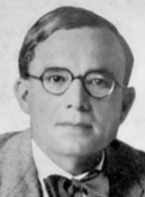J. D. Unwin
Joseph Daniel UnwinMC(6 December 1895 — August 1936) was anEnglishethnologist and social anthropologist atOxford UniversityandCambridge University.


Biography
[edit]Unwin was born on December 6, 1895, inHaverhill, Suffolk.He was educated atShewsbury School.His enrolment atOriel College, Oxfordwas interrupted by the outbreak ofWorld War Iin 1914. He served in theNorthamptonshire Regimentand theTank Corps,where he was twice wounded and awarded theMilitary Cross.After the war, he spent some years inAbyssinia.[1]
In 1933, Unwin received his PhD inanthropologyatPeterhouse, Cambridge.His thesis was titled "Sexual Regulations and Cultural Behaviour". He expanded on his research in his 1934 bookSex and Culture.[1]
Unwin also conducted research work for theHome Officeon the imprisonment of debtors, publishing "Imprisonment for Debt" in 1935. His expertise in social conditions and problems led to his appointment as head ofCambridge House,a social settlement in South London.[1]
Unwin died in August 1936, at the age of 40, following an unsuccessful medical operation.[1]
Contributions to anthropology
[edit]InSex and Culture(1934), Unwin studied 80 primitive tribes and six known civilizations through 5,000 years of history. He claimed there was a positive correlation between the cultural achievement of a people and thesexual restraintthey observe.[2]Aldous HuxleydescribedSex and Cultureas "a work of the highest importance" in his literature.[3]
According to Unwin, after a nation becomesprosperous,it becomes increasingly liberal concerningsexual morality.It thus loses its cohesion, impetus, and purpose, which he claims is irrevocable.[4]
Unwin also stated, "In the past, too, the greatest energy has been displayed only by those societies which have reduced their sexual opportunity to a minimum by the adoption of absolute monogamy [...]. In every case the women and children were reduced to the level of legal nonentities, sometimes also to the level of chattels, always to the level of mere appendages of the male estate. Eventually they were freed from their disadvantages, but at the same time the sexual opportunity of the society was extended. Sexual desires could then be satisfied in a direct or perverted manner [...]. So the energy of the society decreased, and then disappeared." He further notes, "No society has yet succeeded in regulating the relations between the sexes in such a way as to enable sexual opportunity to remain at a minimum for an extended period." And thus, all societies have collapsed. His hope for the future is that, "by placing the sexes on a level of complete legal equality, and then by altering its economic and social organization in such a way as to render it both possible and tolerable for sexual opportunity to remain at a minimum for an extended period," a society may flourish. However, he offers no data to support his hope.[5]
Works
[edit]- Sexual Regulations and Human Behaviour.London: Williams & Norgate, 1933.
- Sex and Culture.London: Oxford University Press, 1934.
- The Scandal of Imprisonment for Debt.London: Simpkin Marshall, 1935.
- Sexual Regulations and Cultural Behaviour.London: Oxford University Press, 1935.
- Sex Compatibility in Marriage.New York: Rensselaer, 1939.
- Hopousia: Or, The Sexual and Economic Foundations of a New Society,with an introduction by Aldous Huxley. New York: Oskar Piest, 1940.
- Our Economic Problems and Their Solution (An Extract from "Hopousia." )London: George Allen & Unwin, Ltd., 1944.
Selected articles
[edit]- "Monogamy as a Condition of Social Energy,"The Hibbert Journal,Vol. XXV, 1927.
- "The Classificatory System of Relationship,"Man,Vol. XXIX, Sep., 1929.
- "Kinship,"Man,Vol. XXX, Apr., 1930.
- "Reply to Dr. Morant's 'Cultural Anthropology and Statistics',"Man,Vol. XXXV, Mar., 1935.
Other
[edit]- Dark Rapture: The Sex-life of the African Negro,with an Introduction by J. D. Unwin. New York: Walden Publication, 1939.
See also
[edit]- Sex and Culture,1934 book by J. D. Unwin
- Ethnology
- Anthropology
References
[edit]- ^abcd"Obituary – J.D. Unwin"(PDF).Nature.138(3484): 234. 8 August 1936.doi:10.1038/138234b0.
- ^Unwin, Joseph Daniel (1934).Sex and Culture.London: Humphrey Milford:Oxford University Press.p. 412.
Any human society is free to choose either to display great energy or to enjoy sexual freedom; the evidence is that it cannot do both for more than one generation.
- ^Huxley, Aldous (1946)."Ethics".Ends and Means.London: Chatto & Windus. pp. 311–2.
- ^Unwin, J. D. (1927). "Monogamy as a Condition of Social Energy".The Hibbert Journal.25:662.
- ^Unwin, Joseph Daniel (1934).Sex and Culture.London: Humphrey Milford:Oxford University Press.p. 431-2.
Further reading
[edit]- Firth, Raymond (1936). "Sex and Culture,"Africa,Vol. 9, No. 1, pp. 126–129.
- Morant, G. M. (1935). "Cultural Anthropology and Statistics; A One-Sided Review of 'Sex and Culture',"Man,Vol. 35, pp. 34–39.
- Yancey, Philip (12 December 1994)."The Lost Sex Study".Christianity Today.Retrieved23 September2017.
